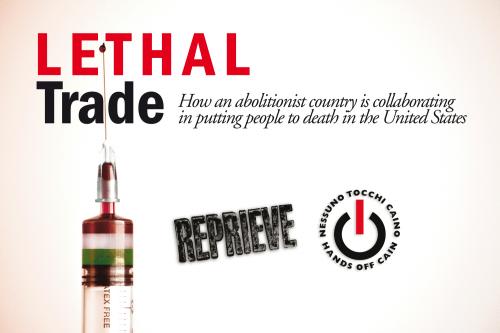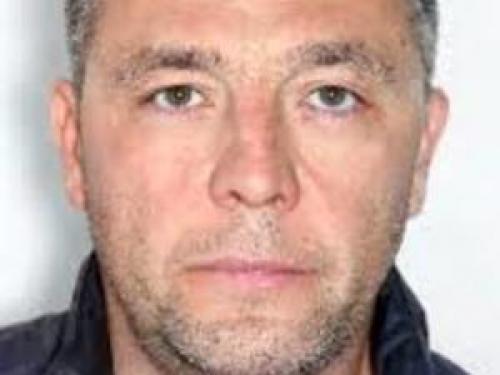03 May 2017 :
The Shortage of Pentothal in USA
Sodium thiopental, also known as Pentothal, is the barbiturate used in all the lethal injection protocols in the various states of the U.S.A.: in protocols involving three drugs it is the first drug injected, while in new protocols based on a single drug solution, it is the drug of choice.
In the second half of 2010, Hospira Inc., the sole U.S. manufacturer of sodium thiopental, announced it will not be able to produce a new supply until early 2011, due to a shortage of its active ingredients. Some states have been forced to halt or delay executions because their supplies of sodium thiopental were soon to expire.
At the beginning of the year, Ohio created an execution schedule based on the difficulty of acquiring Pentothal.
On 25 August 2010, Kentucky announced that it would not be able to carry out two executions, despite pending death warrants, because the State only had enough sodium thiopental to perform a single lethal injection. Kentucky has 9.5 grams of sodium thiopental available, according to Department of Corrections documents. Execution requires 3 grams, plus an additional 3 grams for backup injection. "We have reached out to some other States, but that has not been fruitful," said J. Michael Brown, secretary of the Justice and Public Safety Cabinet. "We've had other States call us trying to find it."
In Missouri, executions were postponed because available supplies of Pentothal had expired in January of 2011 and no new supplies were available.
In California a once unimaginable event took place. On 30 September 2010, Federal Judge Jeremy Fogel conceded Albert Greenwood Brown, a 56 year-old black man, a two-day stay of execution, enough to surpass the 1 October expiration date of the only dose of Sodium Pentothal available to California's executioner.
On 19 November 2010, because of a lack of Pentothal, U.S District Judge Stephen P. Friot ruled that Oklahoma can use pentobarbital, known to be used by vets to kill lame horses or terminally ill animals, in its lethal injection formula for death row inmates. The appeals court found that the amount of pentobarbital to be used was "sufficient to induce unconsciousness in an inmate and indeed would likely be lethal in most, if not all, instances." Capital punishment specialists meanwhile warned that the drug had not been properly vetted and might not keep inmates unconscious during the more painful subsequent injections that kill them. On 16 December 2010, Oklahoma executed John Duty, 58, with pentobarbital, normally used by veterinarians to put animals to sleep. Duty was the first US death row inmate to be executed using the drug. Oklahoma conducted an execution on 14 October 2010, after obtaining a dose of sodium thiopental from neighboring Arkansas.
The only state which would seem to have no problems concerning Pentothal, at least until March 2011, is Texas, American champion of the death penalty. The Attorney General has ruled that the source of the state's lethal injection drugs should be made public. Texas reportedly has sufficient quantities of sodium thiopental for 39 executions, but the supply has an expiration date in March 2011.
Supply from Abroad
The shortage of Pentothal throughout the United States has forced many states to look for suppliers abroad.
In a memorandum dated 30 September 2010, it is recorded by the Tennessee Department of Corrections that the State has ordered a supply of Sodium Thiopental from a foreign source. On 2 November 2010, Reprieve, a British humanitarian organization working against the death penalty and torture worldwide, released an anonymous “Sales Agreement” (Attachment 1), which records purchase by the authorities in Tennessee of $18,000-worth of sodium thiopental constituting four "procedures" or doses from an unnamed supplier, probably British. Clive Stafford Smith, Reprieve's director and representing a client on death row in Tennessee, Edmund Zagorski (scheduled to die on 11 January 2011), said: "US doctors have told us they do not use this drug [as an anesthetic] any more. It is ironic that Ed Zagorski is on death row, accused of playing a role in a drug deal gone bad. If the British government continues to adhere to its policy of gutless inaction, he will die as a result of another drug deal gone bad, this time with a British company pocketing $18,000 in blood money."
Arizona confirmed that it had imported supplies of the drug from Britain in order to execute Jeffrey Landrigan on 25th October 2010, in the execution chamber at the state prison in Florence, Phoenix.
Following a Court order issued on 5th November 2010, the State of California has filed on November 22nd a Defendants’ Notice (Attachment 2) reporting that the California Department of Corrections and Rehabilitation (CDCR) has ordered 521 grams of sodium thiopental which they expect to receive during the week of the 29th November 2010. These drugs, which expire in 2014 (the same year as the drugs imported from the UK to execute Mr. Landrigan last month), have most likely come from Europe and, since in general just 5 g of sodium thiopental are required per execution, could potentially be used to kill about 90 people.
Legal Initiatives in the United Kingdom and Italy
After Arizona officials said that it had imported the sodium thiopental from Britain in order to execute Jeffrey Landrigan in October 2010, Reprieve launched a legal action to prevent a UK-manufactured sodium thiopental being exported for the execution of another two US prisoners, Ralph Baze in Kentucky and Edmund Zagorski, whose execution is scheduled in Tennessee on 11th January 2011.
There is only one licensed UK manufacturer, Archimedes Pharma UK in Reading, and Archimedes denies knowingly providing the drug for that purpose. The firm insists that it has no control over the drug's use once it is sold to medical suppliers.
On 28th October 2010, Reprieve and British lawyers Leigh Day & Co contacted the Government and asked for emergency measures to be taken to avoid British complicity in a series of American executions. Richard Stein, of Leigh Day & Co, said: "There is a list [of banned UK exports] which covers guillotines, gas chambers and electrocution equipment. We are simply asking Vince Cable [the Secretary of State for Business Innovation & Skills] to add sodium thiopental to this list." But Vince Cable declined stating: "Sodium thiopental is a medicine. Its primary use is as an anesthetic … Legitimate trade of medical value would be affected by any restriction on the export of this product from the UK." Any ban would be ineffective, he added, because supplies could be obtained from elsewhere.
Following this decision, Reprieve, together with lawyers from Leigh Day & Co. took the matter to the High Court. They proved that sodium thiopental is not used as a medicine in the US (thus negating the secretary of state’s first reason for not imposing a ban) and denounced the idea that Britain should act immorally since, according to Vince Cable’s logic, if they don’t do it, others will. Furthermore, they proved to the court that there can be no legitimate trade of sodium thiopental between the US and UK since FDA legislation does not allow it.
On 28th November 2010, the night before the final court hearing, Vince Cable issued a statement which was read out in court the following day. In light of all the evidence, he decided to revoke his initial decision and instead do what Reprieve had initially suggested and impose an export ban on sodium thiopental. He also said that he would ‘explore with the European Commission, the European Parliament and other Member States the possibility of implementing an export control on sodium thiopental on an EU-wide basis’.
After the British government's decision, Hospira has become the key source (and soon, the only source) of Pentothal for lethal injection in US penitentiaries.
On 16th November 2010, Reprieve reported that Hospira Spa, a subsidiary of the US multinational, based in Liscate, just outside Milan, was commissioned to produce Pentothal and that, starting in January 2011, it would begin exporting the substance to the U.S.A.
A statement from the company with headquarters in Illinois points out that “the medicine has not been slated for use in the death penalty and Hospira does not support its use in such a procedure. In the spring of 2010, Hospira contacted corrections departments in the United States to clarify its position, as it had already done on numerous occasions throughout the years, even when the company was part of Abbott”. For Giuseppe Riva, Executive Director of the Italian company, “it is a US problem: it has nothing to do with our operations. Sodium Thiopental is produced for surgical interventions. Its use in the death penalty is inappropriate and only happens in the United States. And regardless, it is not involved in the execution but in the preparatory phase of the condemned. It is used as an anesthetic: if we don't supply it, someone else will.” Riva continued, “Is someone who produces kitchen knives responsible if someone uses one to commit murder?” This, of course, fails to differentiate between a stabbing carried out over a private dispute and a death administered by the State.
Regarding the case of Hospira, Liscate, the President of the Green Party Angelo Bonelli, presented a statement to the Prosecutor of the Republic of Milan on 16th November 2010 with “the aim of preventing the use of Sodium Thiopental in a process which provokes the death of a human being, violating constitution and international treaties and calling for the urgent evaluation of existing conditions that may call for the preventative seizure of the drug”.
A similar initiative was taken by the Secretary of Hands Off Cain, Sergio D’Elia. “If the heads of Hospira Spa of Liscate knew that the drug sent/to be sent to the United States would be used for killing people – regardless of the fact that in the United States it is the State that kills – they should have to answer to charges of complicity to murder, also in terms of resultant damages,” wrote D'Elia in his statement to the Prosecutor of the Republic of Milan, deposited by lawyer Giuseppe Rossodivita of the Radical Party.
Hypocrisy and Falsehood
The defense of Hospira is hypocritical and in many instances untruthful, as amply demonstrated by the facts documented herein which, briefly stated, include: for years Hospira Inc. with headquarters in Illinois was the exclusive supplier of anesthetic for lethal injections; now Hospira Spa of Liscate has taken over the production line; Pentothal is obsolete in the United States where hospital have replaced it with more modern, efficient substitutes and it is now exclusively used for lethal injections; the barbiturate is used in all the lethal injection protocols practiced in America, and in some, it is the single and decisive drug used in provoking death.
Like Hospira of Liscate, in Italy, also the pharmaceutical company Hospira Inc. of Lake Forest, Illinois, states that the company “provides these products because they improve or save lives and markets them solely for use as indicated on the product labeling.”
Despite the fact that the company affirms that Pentothal “is not indicated for the death penalty,” Hospira continues to be the exclusive supplier of anesthetic for lethal injection. This is demonstrated by correspondence between the office of the Governor of Kentucky, Steve Beshear, and Hospira of Lake Forest. In a letter sent on 23rd August 2010 on behalf of the Department of Corrections, the Governor complains that there are “outstanding orders of Pentothal from March 2010” and that the “availability of Pentothal is crucial for numerous pending cases [executions] in Kentucky”. Because of the difficulty of the company to procure the active ingredients of the drug, the Governor is informed that “Hospira would be unable to provide Pentothal to the Department of Corrections of Kentucky until the first four months of 2011 (January-March)” (Attachment 3).
In 2010, not only due to problems connected to the supply of active ingredients (API, active pharmaceutical ingredient), but also because of quality control procedures involved in producing the drug (Sodium thiopental is an aseptic drug, and must be manufactured in aseptic conditions), Hospira decided to shut down the sodium thiopental filling line at the Rocky Mount Plant in North Carolina and transfer this stage of the manufacture to the newer Hospira plant in Liscate (Italy). A representative of Hospira explained to Maya V. Foa of Reprieve that Sodium Thiopental is a relatively difficult drug to manufacture, and that Hospira has considered ceasing manufacture of the drug. However, when they looked at discontinuing it, federal authorities asked them not to. Hospira acknowledged that some people want them to continue manufacturing Sodium Thiopental for execution purposes. The real news is that from now on it will be manufactured in Italy. The API will be bought from the vendor in Germany and transported back to the plant in Liscate, where the sodium thiopental will be filled into vials. From there, the product will be exported to the USA, within Europe, and to other countries. (Attachment 4)
Furthermore, Pentothal is used exclusively for lethal injections in the US, being an obsolete drug which has been widely substituted by more modern and efficient drugs.
In a witness statement before the High Court of Justice, where the suit filed by Reprieve was underway, Steven L. Shafer, Professor of Anesthesiology at Columbia University, stated: “I have over twenty-five years experience practising anesthesiology… I have not used sodium thiopental in 20 years. Clinical use of sodium thiopental in the United States is negligible. Sodium thiopental is an obsolete drug and has been replaced by propofol. Some U.S. hospitals may have a thiopental on their pharmacy shelves, but I do not believe any company is currently selling thiopental in the United States.” (Attachment 5)
Finally, it is not true that Pentothal “is not involved in the execution but only in the preparatory phase of the condemned”. It is the barbiturate present in all the lethal injection protocols in the various states of the U.S.A.: in three drug protocols it is the first drug administered, while in new single-drug protocols it is the drug of choice.
As is well known, in recent years there has been much controversy over the second of the three drugs used in the lethal injection protocol. The second drug, which paralyzes the muscles, in reality only serves to impede the condemned from demonstrating any pain brought on by the third drug, which stops the heart, but it does not prevent the pain itself. A pain, in fact, highly acute and lasting. Studies carried out by experts of anesthesiology, point to the possibility that the first drug to be injected, the barbiturate, used to render the condemned unconscious for the administration of the other two drugs, could prove insufficient, or, in some cases, could wear off too early.
After the botched execution of Romell Broom in September 2009 (after two hours of trying to find a vein they were forced to interrupt the execution), on 13 November 2009, Ohio adopted a new execution protocol, switching from a three-drug injection, to a single injection into one vein. The single-drug technique amounts to an overdose of anesthetic, sodium thiopental. The new protocol of Ohio was applied to Kenneth Biros, executed with the new system in December 2009. ABC News compared the end of the condemned to that of a guinea pig, the animal used in scientific research often at the cost of its life. Despite the use of the one-drug method, the execution was not without problems: the lawyer of Biros declared that the executioner made nine attempts before successfully finding Biros’ vein.
On 2 March 2010, Washington became the second State to change to the single-drug protocol. On 10 September 2010, Cal Coburn Brown, 52, white, was executed at the Washington State Penitentiary in Walla Walla. Brown's execution marked the first time the state has used the single-drug method of execution. Brown was administered five grams of the sodium thiopental intravenously.
Europe Death-Penalty Free, However...
The EU Council Regulation 1236/2005 contains the principles requiring Member States of the European Union to impose sanctions on exports that could be used in the practice of the death penalty. “These rules”, it is written, “are instrumental in promoting respect for human life and for fundamental human rights … Such rules should ensure that Community economic operators do not derive any benefits from trade which either promotes or otherwise facilitates the implementation of policies on capital punishment…” Thus establishing the European norm, “Any export of goods which have no practical use other than for the purpose of capital punishment or for the purpose of torture and other cruel, inhuman or degrading treatment or punishment shall be prohibited, irrespective of the origin of such equipment.”
Although it is originally an anesthetic and is, therefore, included in the list of essential drugs of the World Health Organization, the use of the Pentothal in the United States is, as we have seen, only destined to the practice of the death penalty.
As far as Italy is concerned, besides the norms imposed by Europe in the form of EU Council Regulation 1236/2005, there exists even more compelling constitutional norms.
In 1996, the Constitutional Court established a constitutional conflict with the pending extradition of an Italian citizen (Pietro Venezia) to the United States (Florida) to undergo a trial for a crime punishable by death, regardless of assurances offered by US authorities – which could have been “sufficient” according to norms regarding extradition in effect at the time in Italy – declaring that no such penalty would be carried out. “The prohibition contained in art. 27, fourth paragraph, of the Constitution, and the values therein prescribed – foremost, the essential integrity of life – imposes an absolute guarantee,” the Court ruled.
In explaining its ruling, the Court wrote: “The prohibition of the death penalty has particular relevance, equal with that of punishments against humanity, in the first part of the Constitutional Charter. Introduced in the fourth paragraph of art. 27, it underlines a principle ‘that can be said in many senses to be Italian’ (from a report by the Commission of the Assembly for the Constitution in the section dedicated to civic relations), a principle which figures in the constitutional framework as a projection of the guarantees surrounding right to life: the fundamental human right as recognized in art. 2.”
In the past, in sentence n. 54 of 1979, the Constitutional Court already affirmed that “the cooperation, on the part of the Italian State, with the execution of penalties that could not be imposed under any hypothesis, for any crime whatsoever, in Italy in time of peace, it was unconstitutional in itself.”
The case of Hospira Spa of Liscate is even more egregious, because – as is clearly stated by its Executive Director – up to today the company is not subject to those obligations of “sufficient assurances” that the death penalty is not a possibility as with the case of Pietro Venezia. The Milanese pharmaceutical manufacturer has less assurances than ever, far from “absolute guarantees”, that the Pentothal that they produce will not be used in existing lethal injection protocols in the United States.
Actually, it is certain. If Hospira, the only company with official authorization from the FDA to manufacture and sell Sodium Thiopental on US territory, is able to transfer its production of the drug to the Liscate factory, nothing can be done to prevent this drug, produced in Italy by Italian workers, from being used to kill human beings in the United States. Today, all that is missing is the activation of production in Liscate to get the USA death penalty machine up and running again.
To avoid “the cooperation on the part of the Italian State”, as the Constitutional Court says, “with the practice of the death penalty in the United States, the MP and Treasurer of Hands Off Cain, Elisabetta Zamparutti, presented a motion in Italian parliament on 25th November which calls on the government to “take on every initiative to guarantee that – in full respect for domestic law and European norms which prohibit cooperating in any way with the practice of the death penalty, torture or cruel and inhuman treatment – the production and sale abroad of Sodium Thiopental by the pharmaceutical company Hospira based in Liscate be authorized solely for medical purposes, in such a ways as to ensure that in the manufacturer’s authorization, on the drug’s label and in all the trading contracts it is clearly stated that the product is not to be used for the practice of lethal injections.
After the decision of the British government to impose a ban on the exportation of Pentothal, Hospira truly is the most important source (if not the only source) of the drug for US penitentiaries.
It would be a paradox if Italy, that has abolished the death penalty and is committed to the approval of a new Resolution for the universal Moratorium on capital punishment at the United Nations, made itself an accomplice to the death penalty in the United States where the shortage of poison for lethal injections is bringing about a de facto moratorium on executions.








